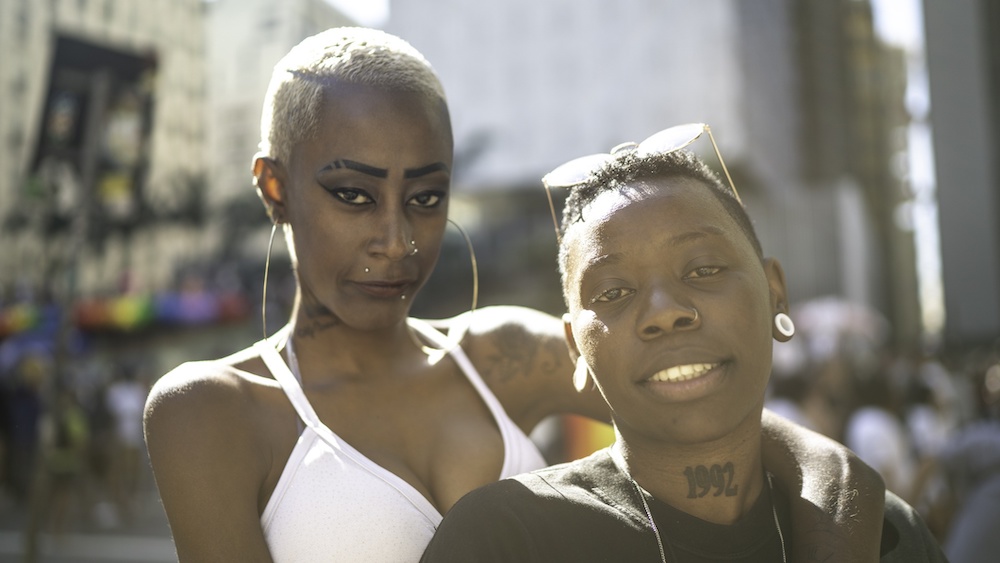If you’re interested in sharing your opinion on any cultural, political or personal topic, create an account here and check out our how-to post to learn more.
Opinions are the writer’s own and not those of Blavity's.
____
Beyoncé's grand opus Lemonade re-popularized Malcolm X's stance, "the most unprotected person in America is the Black woman." This was true nearly 60 years ago and still is in our modern day.
During the Greensboro, North Carolina, sit-ins of the 1960s, Black students sat at segregated whites-only lunch counters to demand basic civil rights. Yet, despite calls for inclusivity, the Civil Rights Act of 1964 included public accommodation protections on the basis of race, but not of sex. Such limitations were only half useful for Black women, like Rev. Dr. Pauli Murray, the original architect of the sit-ins tactic, and a prominent Civil and Women’s Rights activist.
Since 1964, Black women have been entering restaurants, hotels, motels, stadiums, concert venues and movie theaters with our fathers, brothers, boyfriends/husbands and homeboys with less legal rights and protections from discrimination. The same is true for members of the LGBTQ+/Same Gender Loving (LGBTQ+/SGL) community, such as Bayard Rustin, the chief organizer of the famous 1963 March on Washington.
We are living under an outdated definition of public accommodation protections. For generations, marginalized people, communities, and allies have urged the federal government to update and modernize legislation to define and include more specific protections from discrimination, such as people living with disabilities secured under the ADA (federally funded programs, transportation, pharmacies, doctor's offices, retail stores, services, etc). It is past time that we update our civil rights laws to include all of us.
Fortunately, there is already a bill that the U.S. House passed earlier this year to improve and modernize the protections established in the Civil Rights Act of 1964. The piece of legislation we're describing is the Equality Act, which is currently awaiting further consideration by the U.S. Senate. The Equality Act will expand civil rights protections for millions of Black women, Black LGBTQ+/SGL people, and everyone else too, while protecting the balance and improving protections for religious freedom and civil rights.
Most of the national focus on the Equality Act has largely centered around LGBTQ+ protections, but most aren’t aware that the legislation includes crucial protections for broader communities, including millions of Black women, who lack full, legal, federal civil rights protections in various places created to serve or be open to the public.
When #ExistingWhileBlack was trending on social media, a number of the highlighted scenarios detailed results of legal discrimination against Black women and the Black LGBTQ+/SGL community. These experiences ranged from being kicked off an Amtrak train for laughing too loudly to getting intentionally ignored by rideshare or taxi drivers, and even being followed while shopping in stores.
Many people genuinely believe the Civil Rights Act of 1964 provided a legal remedy for all forms of discrimination. In reality, this legislation left more work to do for Black women, at the time Black people living with disabilities, Black LGBTQ+/SGL people, Black low-income people and Black people living at the intersection of other marginalized identities.
It should not be a surprise that Black women and LGBTQ+/SGL people are still often harassed, assaulted and discriminated against in public spaces. This discriminatory treatment takes place in the child welfare system, criminal justice system, mass transit, and when trying to access federal funds. Such treatment is not mentioned or protected against under the Civil Rights Act of 1964, but could be protected if we pass the Equality Act.
Right now, LGBTQ people of color, including same gender loving and transgender Black women, are 38% more likely to face discrimination than our white counterparts. 51.4% of Black LGBTQ+/SGL Americans live in the South in predominately Black communities, in states where anti-discrimination protections for our community are less likely to exist. People and businesses that continue to exclude our people from opportunities know how to exploit the gaps, and they are likely to get away with the harm they have caused our community members.
The Equality Act would close these loopholes in existing civil rights law — including the Civil Rights Act of 1964, the Fair Housing Act, and more — while also modernizing and improving it for today to include protections in transportation services (such as taxis, trains and rideshares) and federally funded programs; including many places that are used as polling locations, retail stores, beauty salons and barbershops, and more. If passed, this historic federal legislation would expand protections to millions of women, people of color, LGBTQ+ people, ethnic minorities and people of all faiths.
To pass the Equality Act, we need over 60 votes in the Senate, which requires people across the country to share their support with their U.S. Senators. If 60 votes are not possible, we need to eliminate the filibuster and pass this vital legislation, as no procedural mechanism is worth more than our human rights. We can strengthen our nation’s civil rights laws ensuring freedom and opportunity for all of us — but it will require all of us to take action.
____
Melanie Campbell is the President & CEO of the National Coalition on Black Civic Participation, and Victoria Kirby York is the Deputy Executive Director of the National Black Justice Coalition.
